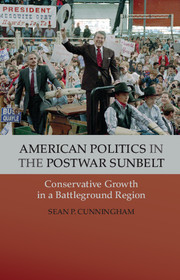Book contents
- Frontmatter
- Dedication
- Contents
- Acknowledgments
- Introduction
- 1 Convergence, Metropolitanization, and Anticommunism
- 2 Race, Rights, and the Liberal Consensus
- 3 Wars against Liberalism
- 4 Southern, Suburban, and Sunbelt Strategies
- 5 Mobilizing the Religious Right in the Politicized “Bible Belt”
- 6 Reagan’s Sunbelt, Reagan’s America
- 7 Shades of Red, Shades of Blue
- Epilogue
- Index
- References
3 - Wars against Liberalism
Published online by Cambridge University Press: 05 July 2014
- Frontmatter
- Dedication
- Contents
- Acknowledgments
- Introduction
- 1 Convergence, Metropolitanization, and Anticommunism
- 2 Race, Rights, and the Liberal Consensus
- 3 Wars against Liberalism
- 4 Southern, Suburban, and Sunbelt Strategies
- 5 Mobilizing the Religious Right in the Politicized “Bible Belt”
- 6 Reagan’s Sunbelt, Reagan’s America
- 7 Shades of Red, Shades of Blue
- Epilogue
- Index
- References
Summary
If politics during the first two decades of the postwar era were characterized by an embattled but resilient liberal consensus, then the mid-to-late 1960s were characterized by the unraveling of that consensus and the related fracturing of the New Deal coalition. In 1968, despite Lyndon Johnson’s best efforts, the postwar liberal consensus that had largely framed American politics since the days of FDR finally imploded. When it did, the nation’s political floodgates were breached by waves of ideological polarization, grassroots agitation, and divisive intraparty factionalism. In 1963, nearly half of American voters identified themselves as “liberal.” By decade’s end, that number had been reduced to barely 33 percent. For most of these voters, liberalism simply did not stand for the same things at decade’s end that it had fewer than ten years before. Circumstances had changed. More than anything, liberalism no longer seemed as competent or triumphant. An unpopular war in Vietnam, coupled with the perceived failure of Johnson’s most ambitious domestic programs, not to mention the ongoing struggle for racial equality that continued to rage nationwide, all worked against liberalism’s forward march. As the liberal consensus evaporated, a new brand of conservatism, birthed predominantly in the metropolitan Sunbelt, began to ascend in ways that many would have thought impossible just a few years earlier.
The Democratic Party’s struggles were clearest in the Sunbelt, especially in the South. During the mid-to-late 1960s, Democrats divided into increasingly polarized camps, thanks to disagreement on issues including civil rights, entitlement spending, foreign policy, and – broadly speaking – the role of the federal government in citizens’ lives. Southern whites were among the first to leave the party of Jefferson, Jackson, and Roosevelt. Although not all southern whites left the Democratic Party during these years, by 1968 it was clear enough that the New Deal coalition that had functioned as the party’s electoral safety net since the 1930s had been irreparably compromised.
- Type
- Chapter
- Information
- American Politics in the Postwar SunbeltConservative Growth in a Battleground Region, pp. 91 - 125Publisher: Cambridge University PressPrint publication year: 2014

